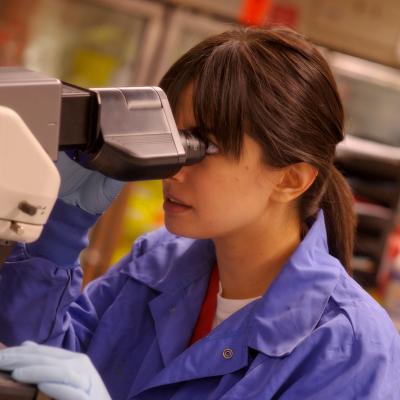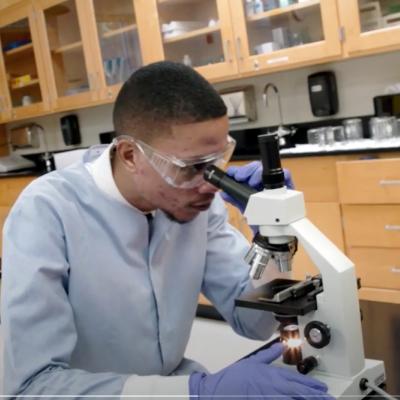- AdventHealth University
Within the last few years, individuals and nations around the world have faced unprecedented threats from fast-spreading viruses and the health consequences of a changing climate. Whether it’s in the hospital or in the research laboratory, medical laboratory scientists are at the center of addressing these threats through studying, diagnosing and treating both new and well-known health issues.
In fact, 70% of today’s medical decisions are based on the results of research and testing that medical laboratory science experts perform. From diagnosing cancer before it spreads to testing drugs that can help improve the lives of patients, medical laboratory scientists have a wide breadth of medical skills that can apply both in a hospital setting and within public health careers out in the community.
If you are interested in health care careers that will allow you to make long-lasting impacts on the public health of your community, state or the entire country, earning a Bachelor of Science in Medical Laboratory Sciences is the best first step you can take to putting your medical skills to use protecting individuals from health threats for generations to come.
In this article, we’ll look at how medical laboratory scientists apply their training in public health careers, and you’ll learn what sets AdventHealth University’s medical laboratory science program apart from others in preparing your for these roles.
Medical Laboratory Sciences and Public Health: An Ideal Match
Medical laboratory scientists — also known as clinical laboratory scientists or medical technologists — perform complex tests on samples from patients using cutting-edge technology. Their list of medical skills is extensive: Identifying and treating heart disease, diabetes, cancer and many other health issues. In addition to diagnosing and finding treatments, they also work with providers to make decisions such as hospital admission and discharge.
This wide variety of responsibilities and medical skills make medical laboratory scientists great candidates for many unique public health careers. Whether they are educating the public, coordinating community health initiatives, researching potential new diseases or performing behavioral research, medical laboratory science professionals can excel in many health care careers outside a hospital or clinic setting.
Medical Laboratory Science Curriculum
Developing and strengthening these medical skills starts with the foundational curriculum of a BS in Medical Laboratory Science program. One of the defining features of medical laboratory sciences is the diverse training that you’ll receive.
Here are just some of the topics that you can dive into as you prepare to become a medical laboratory scientist:
- Clinical chemistry
- Hematology
- Urinalysis
- Immunology and serology
- Parasitology and mycology
- Microbiology
- Molecular diagnostics
- Philosophy of healthcare
As you study these topics, you’ll also gain hands-on experience in labs and hospitals working alongside experienced educators and health care providers. This real-world experience will help you build an impressive resume of medical skills that will set you apart from other candidates as you apply for public health careers both in Florida and around the nation.
Public Health Careers for Medical Laboratory Scientists
Health care careers are among the fastest growing in the nation — thanks in large part to an aging population and heightened awareness of the importance of public health. Earning a Bachelor of Science in Medical Laboratory Sciences prepares you for careers in hospitals and clinics working closely with providers to diagnose and treat individual patients, bit can also prepare you to apply your research and medical skills on a grander scale in public health careers throughout the country and the globe.
Let’s take a look at just a few of the impactful health care careers you could pursue as a medical laboratory scientist.
Epidemiologist
With medical skills in immunohematology, microbiology, research and diagnostics, you’ll have a stable foundation to build on in either a public health or epidemiology master’s program. As you complete your medical laboratory science program, you should also have many opportunities to translate your research findings into informative reports and presentations to share with your team or other professionals.
These skills are essential to studying real-world samples on a large scale and synthesizing your results to share with both experts and citizens. You can apply your detective-like medical skills to tracking diseases, discovering patterns and studying medications that can address the rising threat.
According to the U.S. Bureau of Labor Statistics (BLS), job opportunities for epidemiologists are expected to grow up to 27% by 2032, much faster than the national average for other occupational fields. This also makes epidemiology one of the fastest-growing health care careers. As an epidemiologist, you could look forward to an average annual salary of around $79,000.
Health Education Specialist
If you would rather apply your medical skills to educating individuals in your community, health education might be one of the best public health careers for you. Whether you want to work with children, adults or families, becoming a health education specialist is a fantastic way to share your expertise as a medical laboratory scientist and empower others to make positive changes in their behavior to improve their health and stay safe.
Health educators work in a variety of settings — including healthcare facilities, public health departments, businesses and nonprofits. You don’t have to worry about missing research as a health education specialist, since another key feature of health education is collecting and studying data about communities and individuals’ behavior to improve programs and health services. Health education may be one of the best health care careers for you if you enjoy communicating with others on a daily basis.
The BLS predicts that career opportunities in health education will grow up to 7% by 2032 — on par with other career fields throughout the country. On average, health education specialists earn $60,000 a year.
Medical Scientist
If you see yourself working in a lab setting, medical science may be the path for you. Medical scientists apply their medical skills to conducting wide-ranging research with the focus on improving overall health outcomes for individuals and communities alike.
Medical laboratory science professionals who become medical scientists might design and oversee clinical trials with patients to test out new medicines or vaccines. They may focus on toxicology and study the impacts that chemicals and pollutants have on public health.
They also continually work to push the field of public health to innovate and embrace new technologies. Medical science is a great health care career for those who enjoy sharing their research with other professionals in peer-reviewed journals.
The BLS expects the jobs for medical scientists will grow up to 10% by 2032, much faster than average compared to other occupations. Many public health careers within the field of medical science require advanced degrees, but you can expect to earn an average salary of about $100,000 after graduating.
Start Your Medical Laboratory Science Adventure at AdventHealth University
Now that you better understand the diverse public health careers that you could pursue with a degree in medical laboratory sciences, it’s time to take the next step: finding the right program to hone the medical skills to excel as a medical laboratory scientist. AdventHealth University’s Bachelor of Sciences in Medical Laboratory Sciences offers a rigorous curriculum, engaged community and the support from our highly experienced faculty advisors to prepare you for success in a vast number of health care careers.
There are many features that make our medical laboratory science program stand out among the others:
Practical clinical experience: You’ll develop your medical skills during practical rotations in the 25 clinical lab sites within AdventHealth’s Central Florida Division. Experience hands-on training in clinical chemistry, microbiology, anatomy, urinalysis and research methods. When you graduate from the medical laboratory science program, you’ll have a strong resume to show potential employers your dedication to the field.
Respected faculty mentors: We keep our classes small to ensure that you have plenty of opportunities for one-on-one interactions with our medical laboratory sciences faculty experts. They bring their decades of experience as educators, public health advocates and medical laboratory scientists into each class to share their medical skills and prepare you for the rewarding challenges of health care careers in the twenty-first century.
Professional Affiliations: AdventHealth University partners with the AdventHealth system of care to help graduates find careers doing what they love sooner. In fact, over 80% of our graduates go on to health care careers within the AdventHealth system. Some locations will even offer signing bonuses.
Take the First Step. Start Your Application.
If you’re ready to prepare for public health careers and make lasting impacts on the healthcare system, join AdventHealth University’s Bachelor of Science in Medical laboratory Sciences and start building your research and medical skills.
Recent Blogs

Wonder what the difference is between clinical and medical laboratory sciences? We're diving in to explain these two similar but different areas of focus.
